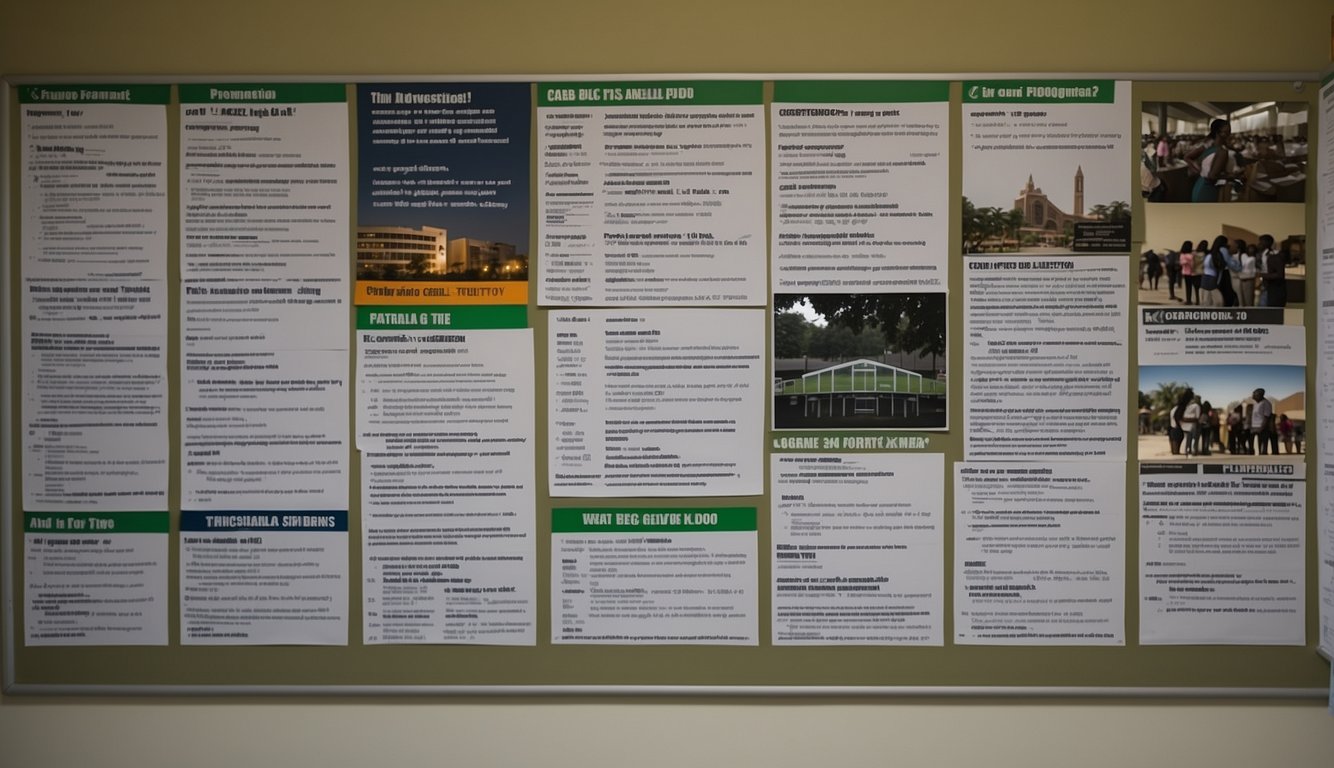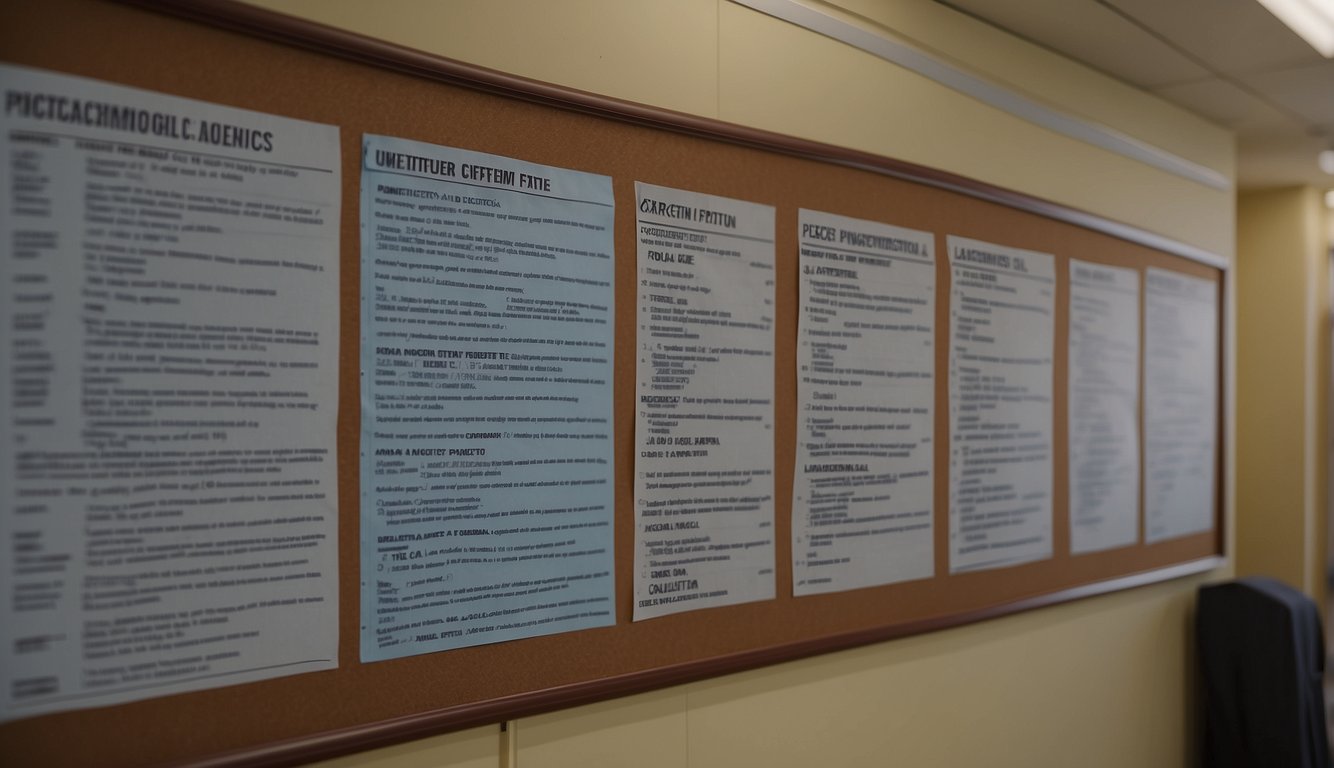To study economics in Nigerian universities, there are certain requirements that you need to meet. Economics is a popular course of study in Nigeria, and many students aspire to pursue it. However, before you can gain admission to study economics, you need to fulfill certain academic and non-academic requirements.
Academically, you need to have at least five credits in relevant subjects, including Mathematics and English Language, in your Senior Secondary School Certificate Examination (SSCE) or its equivalent.
Additionally, you need to score a minimum of 180 in the Unified Tertiary Matriculation Examination (UTME) conducted by the Joint Admissions and Matriculation Board (JAMB). These requirements are the basic criteria for admission into any Nigerian university to study economics.
However, some universities may have additional requirements, such as a higher UTME score or a specific subject combination.
Non-academically, some universities may require you to meet certain age or character requirements. For instance, some universities may require you to be at least 16 years old before you can gain admission to study economics.
Some universities may require you to provide a letter of good conduct from your previous school or a police clearance certificate.
These requirements are put in place to ensure that students admitted to study economics are of good character and can contribute positively to the university community.
Table of contents
- Economics Education in Nigeria
- General Admission Requirements
- Specific Requirements to Study Economics
- Degree Programs and Specializations
- Curriculum and Coursework
- Accreditation and Quality Assurance
- Career Prospects and Opportunities
- Admission Process and Registration
- List of Nigerian Universities Offering Economics
Economics Education in Nigeria

If you are interested in studying economics in Nigeria, it is important to understand the historical context and significance of economics in national development.
Historical Context
Economics education in Nigeria has a long history, dating back to the colonial period. The first economics department was established in 1948 at the University of Ibadan, and other universities followed suit.
In the post-independence era, economics became a popular subject, and many universities began to offer degree programs in economics.
Significance of Economics in National Development
Economics is an important discipline that plays a critical role in national development. In Nigeria, economics has been identified as a key economic growth and development driver. The government has recognized the importance of economics education and has made efforts to promote the study of economics in universities.
Economics education in Nigeria is designed to equip students with the knowledge and skills to analyze economic issues and make informed decisions. The curriculum covers various topics, including microeconomics, macroeconomics, econometrics, public finance, and international trade.
In conclusion, studying economics in Nigerian universities can provide you with a solid foundation in the principles and theories of economics. With this knowledge, you can contribute to national development by analyzing economic issues and making informed decisions.
General Admission Requirements

If you are interested in studying Economics at a Nigerian university, there are certain admission requirements that you must meet.
These requirements are set by the Joint Admissions and Matriculation Board (JAMB) and the individual universities.
Unified Tertiary Matriculation Examination (UTME)
To gain admission into a Nigerian university to study Economics, you must first sit for and pass the Unified Tertiary Matriculation Examination (UTME) conducted by JAMB. The UTME is a standardized test that assesses your knowledge in four subjects: English Language, Mathematics, and any two relevant subjects related to your intended course of study.
The minimum score required to be considered for admission into an Economics program varies from one university to another. However, a score of at least 180 in the UTME is generally required.
Direct Entry Requirements
If you already have a degree or equivalent, you can apply for Direct Entry admission into an Economics program in a Nigerian university. Direct Entry candidates must possess a minimum of two A-level passes or equivalent in relevant subjects.
English Language Proficiency
English is the language of instruction in Nigerian universities. Therefore, you must demonstrate proficiency in the English Language to be considered for admission into an Economics program.
You can demonstrate proficiency by obtaining a credit pass in English Language at the General Certificate of Education (GCE) or National Examination Council (NECO) examinations.
In summary, to study Economics in a Nigerian university, you must meet the general admission requirements, which include sitting for and passing the UTME, meeting the Direct Entry requirements, and demonstrating proficiency in the English Language.
Specific Requirements to Study Economics

If you are interested in studying Economics in Nigerian universities, there are specific requirements you must meet to be eligible for admission.
This section will discuss the required subjects and grades and the departmental cut-off marks.
Required Subjects and Grades
To study Economics in Nigerian universities, you must have a minimum of five credit passes in your O’level results. These credit passes must include Mathematics, English Language, Economics, and other relevant subjects. The relevant subjects could be any of the following: Accounting, Business Studies, Government, Geography, History, or Statistics.
Your grades in these subjects also significantly affect your eligibility for admission. Generally, you are required to have a minimum of C6 in Mathematics, English Language, and Economics. However, some universities may require higher grades in these subjects.
Departmental Cut-off Marks
The Department of Economics in Nigerian universities has specific admission cut-off marks. These cut-off marks vary from one institution to another and are usually determined by factors such as the number of applicants and available slots.
Generally, the cut-off marks for Economics in Nigerian universities range from 180 to 250 in the Unified Tertiary Matriculation Examination (UTME). However, some universities may require higher scores in the UTME.
In addition to the UTME score, your performance in the Post-UTME screening exercise also significantly determines your admission eligibility. Therefore, preparing adequately for the UTME and Post-UTME screening exercise is essential.
In conclusion, to study Economics in Nigerian universities, you must meet the required subjects, grades, and departmental cut-off marks. Preparing adequately for the UTME and Post-UTME screening exercise is also essential to increase your chances of gaining admission.
Degree Programs and Specializations

There are several degree programs and specializations if you are interested in economics at Nigerian universities.
In this section, we’ll explore the most common options available.
Bachelor of Science in Economics
The Bachelor of Science in Economics is the most common undergraduate degree program in economics offered by Nigerian universities. This program provides a broad foundation in economics, including microeconomics, macroeconomics, econometrics, and economic theory. It also covers related fields such as mathematics, statistics, and business.
To be eligible for a Bachelor of Science in Economics program, you typically need to have a minimum of five credits in relevant subjects, including mathematics and English, in your Senior Secondary School Certificate Examination (SSCE) or its equivalent. The program usually takes four years to complete.
Specialized Fields in Economics
In addition to the Bachelor of Science in Economics, Nigerian universities also offer specialized degree programs in various fields of economics. These programs are designed to provide students with in-depth knowledge and skills in specific areas of economics.
Some of the specialized fields in economics that you can study in Nigerian universities include:
International Economics
International economics focuses on the economic relations between countries, including trade, investment, and international finance. This field is particularly relevant in today’s globalized economy, where countries are increasingly interconnected.
Development Economics
Development economics is concerned with the economic development of countries, especially developing countries. This field explores the factors that contribute to economic growth and development and the policies and strategies that can promote development.
Economic Planning
Economic planning is setting goals, policies, and strategies for the economy. This field is particularly relevant in countries undergoing rapid economic growth and development, where there is a need for effective planning and management of resources.
Labour Economics
Labour economics studies the labour market, including employment, wages, and working conditions. This field explores the factors that influence labour supply and demand and the policies and strategies that can be used to improve labour market outcomes.
Industrial Relations
Industrial relations is the study of the workplace relationship between employers and employees. This field explores the factors that influence workplace relations, including collective bargaining, dispute resolution, and labour laws.
Environmental Economics
Environmental economics is concerned with the economic aspects of environmental issues, including pollution, natural resource management, and climate change. This field explores the policies and strategies that can be used to promote environmental sustainability.
Health Economics
Health economics is concerned with the economics of healthcare, including the financing and delivery of healthcare services. This field explores the factors that influence health outcomes and the policies and strategies that can be used to improve access to healthcare.
Monetary Economics
Monetary economics is concerned with studying money and its role in the economy. This field explores the factors that influence the supply and demand of money, as well as the policies and strategies that can be used to manage the money supply.
Mathematical Economics
Mathematical economics is the application of mathematical methods to economic analysis. This field is particularly relevant in modern economics, where complex mathematical models are used to understand economic phenomena.
In conclusion, Nigerian universities offer a range of degree programs and specializations in economics that cater to different interests and career goals. Whether you are interested in a broad foundation in economics or a specialized field, there is a program that will suit your needs.
Curriculum and Coursework

To study economics in Nigerian universities, you must complete a curriculum that includes a range of courses in economics, statistics, economic analysis, econometrics, modeling, and research.
The curriculum is designed to provide you with a solid foundation in economic theory and applications and practical skills in data analysis and research methods.
Core Courses and Electives
The core economics courses cover microeconomics, macroeconomics, international trade, and development economics. These courses provide you with a broad understanding of economic theory and its applications to real-world problems.
In addition to the core courses, you can choose from various electives in areas such as environmental economics, health economics, and financial economics to tailor your studies to your interests.
Practical Training and Research
You will also participate in practical training and research to complement your coursework. This may include internships, fieldwork, and research projects. These experiences provide hands-on experience in applying economic theory to real-world problems and developing research skills.
You will also be required to complete a research project or thesis in your final year of study. This project allows you to apply the skills and knowledge you have acquired throughout your studies to your chosen research question. You will work closely with a faculty advisor to design and execute your research project, analyze your data, and present your findings.
Overall, the curriculum and coursework for studying economics in Nigerian universities provide you with a comprehensive education in economic theory and applications and practical skills in data analysis and research methods.
Accreditation and Quality Assurance

To ensure that the quality of education in Nigerian universities is up to par, the National Universities Commission (NUC) has set standards for all courses, including economics.
Accreditation and quality assurance are critical factors when choosing a university to study economics in Nigeria.
National Universities Commission (NUC) Standards
The NUC is responsible for ensuring that Nigerian universities meet the minimum standards for higher education. The commission has set guidelines and benchmarks that universities must meet to be accredited to offer economics as a course of study.
To be accredited, a university must meet the following requirements:
- Adequate number of qualified lecturers
- Well-equipped economics department
- Adequate library facilities
- Access to current economic journals and publications
- Regular academic and research activities
- High-quality teaching and learning materials
- Adequate classroom and laboratory space
- Regular student assessment and evaluation
Accredited Nigerian Universities
To study economics at a university in Nigeria, choosing a university that the NUC accredits is essential. Several accredited universities in Nigeria offer economics as a course of study. These universities include:
- University of Nigeria, Nsukka
- University of Lagos, Akoka
- Obafemi Awolowo University, Ile-Ife
- Ahmadu Bello University, Zaria
- University of Benin, Benin City
Choosing an accredited university ensures you receive a quality education that meets the standards set by the NUC. It also provides that employers and other institutions recognize your degree.
In conclusion, accreditation and quality assurance are critical factors when choosing a university to study economics in Nigeria.
The NUC has set standards that universities must meet to be accredited, and it is essential to choose an accredited university to ensure that you receive a quality education.
Career Prospects and Opportunities

If you are considering studying economics at Nigerian universities, knowing the career prospects and opportunities that await you is important. With a degree in economics, you can pursue various career paths in the public and private sectors.
Job Opportunities and Market Demand
Economists are in high demand in Nigeria, especially in finance, banking, and administration. As an economist, you can work in government agencies, research institutions, financial institutions, and international organizations. You can also work as a consultant, financial analyst, or policy analyst.
According to the National Bureau of Statistics, the unemployment rate in Nigeria was 27.1% in the second quarter of 2021. However, economists are among the professionals in high demand and have a relatively low unemployment rate. Studying economics can increase your chances of finding a job and having a successful career.
Roles in Government and Private Sector
Economists can work as policy advisers, analysts, and researchers in the government sector. They can also work in government agencies such as the Central Bank of Nigeria, the National Planning Commission, and the Ministry of Finance. In these roles, economists are responsible for analyzing economic data, developing policies, and advising government officials on economic matters.
In the private sector, economists can work in financial institutions such as banks, insurance companies, and investment firms. They can also work in research institutions, consulting firms, and multinational corporations. In these roles, economists analyze economic trends, forecast market conditions, and develop business strategies.
In conclusion, studying economics in Nigerian universities can open up many career opportunities in both the public and private sectors. With Nigeria’s high demand for economists, you can be confident that you will have a successful career in this field.
Admission Process and Registration

Studying economics in Nigerian universities requires understanding the admission process and registration requirements. In this section, we will discuss the application procedures and registration deadlines that you need to know.
Application Procedures
To study economics in Nigerian universities, you must apply through the Joint Admissions and Matriculation Board (JAMB). JAMB is responsible for conducting the Unified Tertiary Matriculation Examination (UTME), the entrance examination for Nigerian universities.
To apply for the UTME, purchase the JAMB e-PIN from any accredited bank or JAMB office. You will then proceed to any JAMB-approved CBT center to complete your registration. During the registration process, you must provide your personal information, academic qualifications, course choice, and university.
After completing your registration, you will receive a confirmation slip containing your examination details. You should keep this slip safe as it will be required during the examination.
Registration Deadlines
The registration deadline for the UTME is usually around February or March every year. However, it is important to check the JAMB website for the exact dates as they may vary yearly.
In addition to the UTME, some universities offer direct entry admission for students who have completed a diploma or other relevant qualifications. The registration deadline for direct entry admission is usually around June or July every year.
It is important to note that registration deadlines are strictly enforced, and late registration is usually not allowed. Therefore, completing your registration well before the deadline is advisable to avoid any last-minute rush.
In conclusion, you must be familiar with the application procedures and registration deadlines to study economics in Nigerian universities. Following these requirements increases your chances of gaining admission into your preferred university and achieving your academic goals.
List of Nigerian Universities Offering Economics

If you are interested in studying economics in Nigeria, there are several universities you can choose from. This section will provide you with a comprehensive list of Nigerian universities offering economics.
Federal and State Universities
- Ahmadu Bello University: Located in Zaria, Kaduna State, Ahmadu Bello University is one of Nigeria’s oldest and most prestigious universities. The university offers a Bachelor of Science (B.Sc.) degree in Economics.
- University of Abuja: Located in the Federal Capital Territory (FCT), the University of Abuja offers a Bachelor of Science (B.Sc.) degree in Economics. The university is known for its quality education and state-of-the-art facilities.
- Ambrose Alli University: Ambrose Alli University is state-owned in Ekpoma, Edo State. The university offers a Bachelor of Science (B.Sc.) degree in Economics.
- Adekunle Ajasin University: Adekunle Ajasin University is a state-owned university in Akungba Akoko, Ondo State. The university offers a Bachelor of Science (B.Sc.) degree in Economics.
- Adamawa State University: Located in Mubi, Adamawa State, Adamawa State University offers a Bachelor of Science (B.Sc.) degree in Economics.
- Bayero University Kano (BUK): Located in Kano, Kano State.
- Ebonyi State University: Located in Abakaliki, Ebonyi State.
- Delta State University: Located in Abraka, Delta State.
- Ondo State University of Science and Technology (OSUSTECH): Located in Okitipupa, Ondo State.
- Rivers State University of Science and Technology (RSUST): Located in Port Harcourt, Rivers Sta
Private Universities
- Afe Babalola University: Afe Babalola University is a private university in Ado-Ekiti, Ekiti State. The university offers a Bachelor of Science (B.Sc.) degree in Economics.
- Achievers University: Achievers University is a private university in Owo, Ondo State. The university offers a Bachelor of Science (B.Sc.) degree in Economics.
- Ajayi Crowther University: Ajayi Crowther University is a private university in Oyo, Oyo State. The university offers a Bachelor of Science (B.Sc.) degree in Economics.
In conclusion, if you are interested in studying economics in Nigeria, you have several options. Whether you prefer Federal or, State, or Private universities, there is a university that will meet your needs.
Let me know if you have any questions or need further clarification. I would love to assist you.
You can watch my videos on the Studentship YouTube Channel by clicking here.
Join my Facebook Group, Like my Facebook Page or Follow Me on WhatsApp for more interactive discussions.
